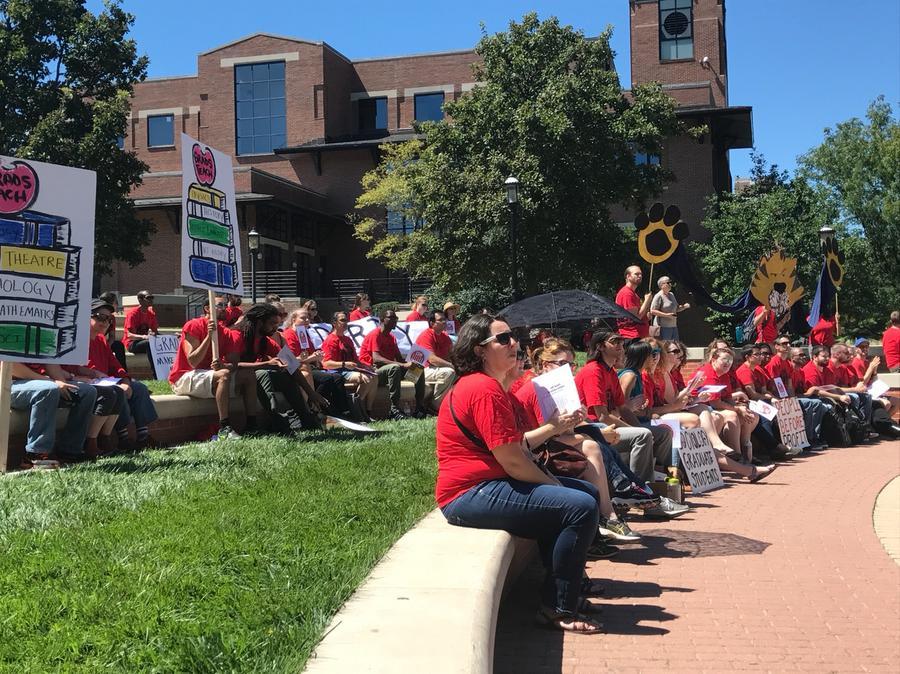The Missouri Coalition of Graduate Workers held its third annual rally in Traditions Plaza Wednesday to speak out and protest for graduate student rights. The group marched around the Francis Quadrangle before meeting back at the plaza.
There were several speakers at the rally, including former Missouri CGW chair and MU graduate student Sarah Senff.
“Grads make Mizzou work,” Senff said to the sea of graduate students sporting red Missouri CGW shirts.
The rally has been held each year in since fall 2015 as “a reaffirmation of our principles and a rededication to organizing the MU community,” according to the group’s official Facebook page. The coalition hopes this rally will act as a “fall kickoff” to the bring awareness issues that still need to be addressed in the coming school year.
The coalition’s primary goal is to “secure a collectively bargained contract that prevents future crises and guarantees competitive wages and benefits for graduate employees,” according to its website.
“We want to energize graduate students who are just returning [for the school year],” Missouri CGW outreach officer Joseph Moore said. “It’s a symbolic way of saying, ‘Hey, we’re still here. This is what we’ve done, and this is what we still need to do.’”
The organization began in 2015, after MU sent out an email to graduate workers 13 hours before the beginning of the school year reporting that its health insurance coverage period would not be renewed for the following year. After various rallies and protests, health insurance subsidies were reinstated, Missouri CGW co-chair Simona Simkins said.
The coalition then began to work with the Missouri National Education Association and the National Education Association.
In April 2016, the Coalition of Graduate Workers filed a lawsuit with help from the MNEA against the UM System for official recognition of the graduate employee union and the ability to negotiate a legally-binding contract. Moore believes the lawsuit will lead to a ruling in the coalition’s favor.
“The university’s primary argument is that we’re not employees of the institution,” Moore said. “We’re all employees. We get W-2s, paychecks [and] have to go through all these HR requirements. That’s the argument lawyers are pressing.”
Coalition member and MU graduate student Zach Rubins said the cut in health insurance was “the straw that broke the camel’s back.” He had been wanting a union for a while and said that in years before there had been a “degradation of pay and benefits.”
In 2014, MU closed the Student Parent Center, a child care center for students with young children. Rubins expressed his concern with this, explaining how many of his colleagues no longer have access to affordable child care.
In addition, MU has discussed ending tuition waivers for its graduate students. Graduate students do not have the same job protections as faculty and, therefore, are more prone to layoffs, Moore said.
Though the CGW has encountered a few setbacks, it has accomplished some of its original goals, such as an increased understanding of the group’s mission by the university.
“The first thing I think, the most salient thing, is that the university has recognized the power of [the coalition] acting together in solidarity,” Rubins said.
Many members have noticed that undergraduates at MU have also begun to support Missouri CGW. Architectural studies graduate student Dawn Van Scoik believes that forming an allegiance with undergraduate students is crucial for the advancement of the group’s goals.
“I told them, ‘Most of your teachers are grad students. Wouldn’t you like to see them protected under insurance?’” Van Scoik said. “I think it’s great that we’re finding allies within the undergraduate community because we know they’re listening. We hope the administration is listening as well.”
In addition, graduate workers have seen an increase in pay.
“One of our successes worked to have an increase in our salaries from being incredibly marginal to something that’s a bit more manageable,” Simkins said.
As for its goals for the future, the Missouri CGW wants to create a contract where their benefits are codified, according to Simkins. In addition, the group would like to train new members for leadership positions, ensuring that the group will continue fighting for graduate students’ rights in the years to come.
“We’re still not recognized as a union and while the university stalls and tries to drag things out at court, we’re trying to make sure that the organization has a solid infrastructure that lasts over the years,” Moore said.
_Edited by Olivia Garrett | [email protected]_








